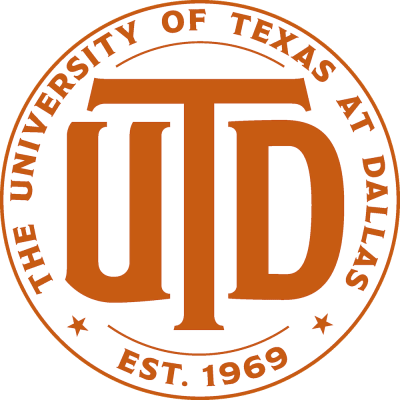
Doctor of Philosophy in Arts, Technology, and Emerging Communication
The University of Texas at Dallas

Key Information
Campus location
Richardson, USA
Languages
English
Study format
On-Campus
Duration
4 years
Pace
Full time
Tuition fees
USD 18,276 / per semester
Application deadline
Request info
Earliest start date
Aug 2024
Introduction
The Ph.D. program in Arts, Technology, and Emerging Communication (A.T.E.C.) is designed for those who wish to engage in deep scholarship or to develop artistic, cultural, or commercial applications of digital technology and emerging media. With a diverse group of faculty and a curriculum that integrates scholarly study with creative practice, A.T.E.C. cultivates creative scholars, scholarly practitioners, and interdisciplinary researchers.
A.T.E.C. Ph.D. students have backgrounds in a variety of relevant fields and are grouped into transdisciplinary cohorts for their first year of coursework, where they investigate foundational theories, questions, and methods that underlie the study of Arts, Technology, and Emerging Communication. Additional coursework is used to practice methods and explore individual interests, including up to 15 hours in courses from other Schools at UT Dallas.
Ph.D. students are expected to participate in the rich, intellectual life of A.T.E.C., including the Dean’s Colloquium speaker series and a vibrant lab and studio culture.
Admissions
Curriculum
Degree Requirements
The Ph.D. program in Arts, Technology, and Emerging Communication is designed for those who wish to engage in deep scholarship or to develop artistic, cultural, or commercial applications of digital technology and emerging media. With a diverse group of faculty and a curriculum that integrates scholarly study with creative practice, A.T.E.C. cultivates creative scholars, scholarly practitioners, and interdisciplinary researchers. The Ph.D. in A.T.E.C. additionally prepares students to teach arts- and technology-related courses in colleges and universities. Students seeking a Ph.D. in Arts, Technology, and Emerging Communication will normally complete a minimum of 60 semester credit hours (42 semester credit hours in coursework and 18 semester credit hours in dissertation) beyond a master's degree or its equivalent, pass doctoral field examinations, submit a dissertation proposal, and complete and defend a dissertation.
Students who have not previously completed six semester credit hours of coursework in computer programming are required to complete ATCM 6304.
Major Core Courses: 9 semester credit hours
- ATCM 6000 A.T.E.C. Dean's Colloquium
- ATCM 6300 Approaches to Arts, Technology, and Emerging Communication
- ATCM 6301 Aesthetics of Interactive Arts
- ATCM 7331 Research Methodology in Arts, Technology, and Emerging Communication
Students are expected to complete ATCM 6300 in their first semester and the remainder of these courses within the first 18 semester credit hours in their degree plan.
Prescribed Electives in A.T.E.C. Research Methodologies: 3 semester credit hours
- ATCM 6361 Design Research Methods
- ATCM 6376 Media and Cultural Studies Methods
- ATCM 6390 Social Science Research Methods in Emerging Communication
- ATCM 7332 Creative Practice Research Methods
Prescribed Electives in Methods-intensive A.T.E.C. Courses: 3 semester credit hours
- ATCM 6304 Computer Processing for Arts, Technology, and Emerging Communication
- ATCM 6326 Research in Sound Design
- ATCM 6352 Socially Conscious Games
- ATCM 6366 Information Architecture and Design
- ATCM 6371 Visualization Research
- ATCM 6375 Critical Approaches to Networked Cultures
- ATCM 6377 Creativity as Social Practice
- ATCM 6386 Digital Textuality
- ATCM 6387 Emerging Media Studio
- ATCM 6388 Critical Making
Recommended Electives: 15 semester credit hours
Fifteen semester credit hours in any graduate course in A.T.E.C. The suggested courses below may be of particular interest to doctoral students:
- ATCM 6322 Experimental Interactive Media
- ATCM 6335 Game Design and Development
- ATCM 6371 Visualization Research
- ATCM 6383 Digital Culture
- ATCM 6386 Digital Textuality
- ATCM 6389 Special Topics in Networked Cultures
- ATCM 6390 Social Science Research Methods in Emerging Communication
- ATCM 6395 Special Topics in Arts, Technology, and Emerging Communication
- ATCM 7340 Advanced Studies in Arts, Technology, and Emerging Communication
- ATCM 7390 Advanced Special Topics in Arts, Technology, and Emerging Communication
- ATCM 7620 Advanced Projects in Simulation and Game Design
- ATCM 7V81 Advanced Doctoral Project Workshop
- ATCM 7V82 Advanced Projects in Interactive Media
Free Electives: 12 semester credit hours
Twelve semester credit hours of electives in any organized graduate-level courses offered by A.T.E.C. or in any organized 6000- or 7000- level courses offered by the School of Arts and Humanities, Erik Jonsson School of Engineering and Computer Science, School of Behavioral and Brain Sciences, Naveen Jindal School of Management, School of Economic, Political and Policy Sciences, School of Natural Sciences and Mathematics, or School of Interdisciplinary Studies. All free electives are subject to approval by the Graduate Advisor.
Doctoral Field Examinations
After completing 36 semester credit hours of coursework applicable to the degree plan, students may proceed to the doctoral field examinations, a sequence consisting of three written sections and one oral section. The examining committee, composed of three members of the graduate faculty, oversees the definition and preparation of the three examination fields within guidelines established by the program. At least three business days before the exams themselves, the faculty members submit examination questions to the Arts, Technology, and Emerging Communication office, which schedules and administers the examination. The maximum time allowed for a student's completion of the examination sequence is 20 business days.
Dissertation (18 semester credit hours minimum)
Students are formally advanced to Ph.D. candidacy when they have successfully completed the doctoral field examinations and received final approval for their dissertation from the four-person supervising committee and the A.T.E.C. Graduate Studies Committee.
Each candidate then writes a doctoral dissertation, which is supervised and defended according to general University regulations. Every student must register for a minimum of nine dissertation semester credit hours in two successive semesters and must maintain continuous enrollment thereafter for at least three semester credit hours during consecutive long semesters until the degree is completed. Any exception to this requirement is granted only by petition to the school's Associate Dean of Graduate Studies.
Career Opportunities
While academia represents an important professional avenue for A.T.E.C. Ph.D. graduates, the industry presents numerous career opportunities in such fields as design, research, and development for new media, education, communication, and information technologies.
English Language Requirements
Certify your English proficiency with the Duolingo English Test! The DET is a convenient, fast, and affordable online English test accepted by over 4,000 universities (like this one) around the world.